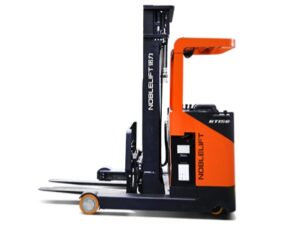Forklift Truck Handling: Essential Training and Certification Requirements for Safe Operations from freeamfva's blog
Forklift trucks are indispensable in various industries, but their operation requires specialized skills and knowledge. Proper training and certification are crucial to ensure the safety and efficiency of forklift operations. This article explores the essential training and certification requirements for forklift truck handling, highlighting the importance of comprehensive education for operators.
The Importance of Training and Certification
Operating a forklift truck involves more than just driving; it requires a deep understanding of the machine's capabilities, limitations, and safety protocols. Proper training and certification help prevent accidents, reduce downtime, and ensure compliance with regulatory standards. Here are some key reasons why training and certification are essential:
 ForkLift reach truck | China Manufacturer Trade supplier Materials Handling reach truck Fork-lifts Truck Sale Buy Online Trade Importer of Industrial Equipment BUY in USA/UK/India/Australia
ForkLift reach truck | China Manufacturer Trade supplier Materials Handling reach truck Fork-lifts Truck Sale Buy Online Trade Importer of Industrial Equipment BUY in USA/UK/India/Australia
Safety: Well-trained operators are less likely to be involved in accidents, protecting themselves and their coworkers.
Efficiency: Proper training ensures that operators can handle the forklift efficiently, reducing the risk of damage to goods and equipment.
Compliance: Certification ensures that operators meet industry standards and regulatory requirements, avoiding potential fines and legal issues.
Training Requirements
Forklift training programs should be comprehensive, covering both theoretical knowledge and practical skills. Key components of a robust training program include:
Basic Operation: Understanding the controls, functions, and limitations of the forklift. This includes learning how to start, stop, and maneuver the machine safely.
Load Handling: Proper techniques for lifting, carrying, and placing loads. Operators should learn how to assess load stability and secure loads to prevent shifting during transport.
Safety Protocols: Adhering to safety guidelines, including speed limits, load capacity, and safe driving practices. Operators should also learn how to identify and mitigate potential hazards in the work environment.
Emergency Procedures: Knowing how to respond to accidents or equipment malfunctions. This includes understanding how to safely shut down the forklift and evacuate the area if necessary.
Certification Process
Certification is a formal recognition that an operator has completed the necessary training and demonstrated competence in forklift truck handling. The certification process typically involves the following steps:
Classroom Instruction: Operators receive theoretical instruction on forklift operation, safety protocols, and regulatory requirements. This may include lectures, videos, and written materials.
Hands-On Training: Operators practice their skills under the supervision of a qualified instructor. This includes operating the forklift in various scenarios, such as navigating tight spaces and handling different types of loads.
Evaluation: Operators are assessed on their knowledge and skills through written tests and practical evaluations. They must demonstrate their ability to operate the forklift safely and efficiently.
Certification: Upon successful completion of the training and evaluation, operators receive a certification card or certificate. This certification is typically valid for a specific period and may require periodic renewal.
Employer Responsibilities
Employers play a critical role in ensuring that forklift operators receive proper training and certification. Key responsibilities include:
Providing Training: Employers must provide or arrange for comprehensive training programs that meet industry standards and regulatory requirements.
Maintaining Records: Employers should keep detailed records of training and certification for all forklift operators. This includes documentation of classroom instruction, hands-on training, and evaluations.
Enforcing Compliance: Employers must ensure that only certified operators are allowed to operate forklifts. They should also conduct regular audits to verify compliance with safety protocols and regulatory requirements.
Promoting Continuous Improvement: Employers should encourage ongoing education and training for forklift operators. This may include refresher courses, advanced training, and updates on new regulations and best practices.
Conclusion
Proper training and certification are essential for safe and efficient forklift truck handling. By investing in comprehensive training programs and ensuring compliance with certification requirements, employers can create a safer work environment and improve operational efficiency. Remember, well-trained operators are the key to successful forklift operations.
Post
| By | freeamfva |
| Added | Sep 24 '24 |
Rate
Archives
- All
- March 2025
- February 2025
- January 2025
- December 2024
- November 2024
- October 2024
- September 2024
- August 2024
- July 2024
- June 2024
- May 2024
- April 2024
- March 2024
- February 2024
- January 2024
- December 2023
- November 2023
- October 2023
- September 2023
- August 2023
- July 2023
- June 2023
- May 2023
- April 2023
- March 2023
- February 2023
- January 2023
- December 2022
- November 2022
- October 2022
- September 2022
- August 2022
- July 2022
- June 2022
- May 2022
- April 2022
- March 2022
- February 2022
- January 2022
- December 2021
- November 2021
- October 2021
- September 2021
- August 2021
- July 2021
- June 2021
- May 2021
The Wall